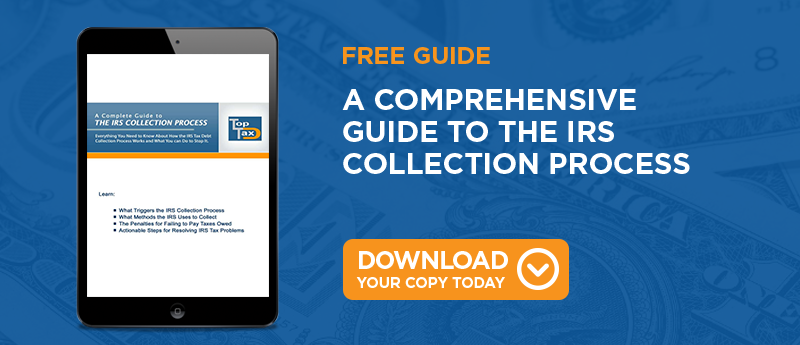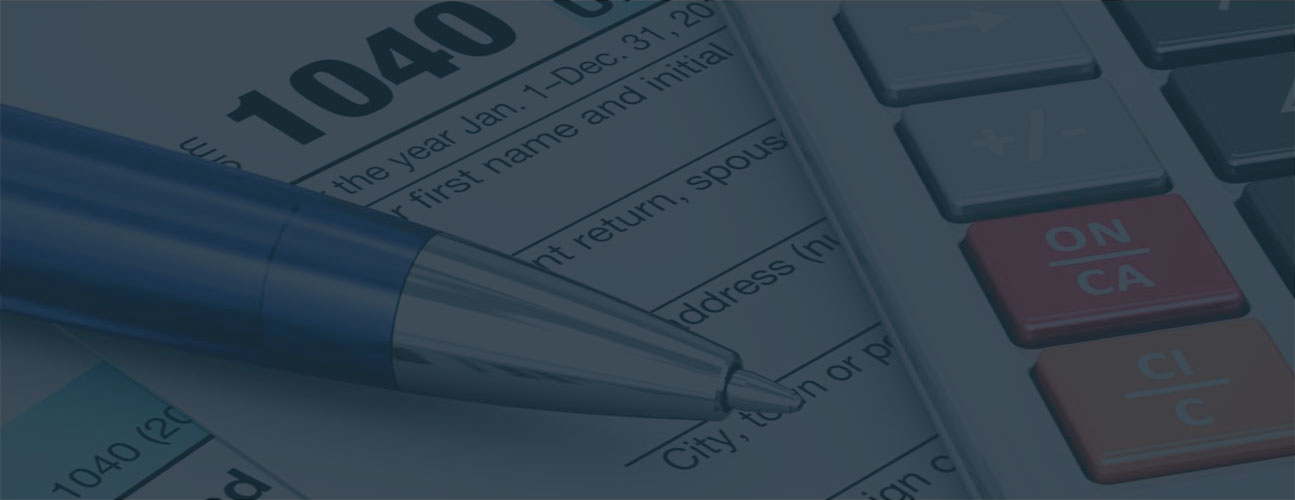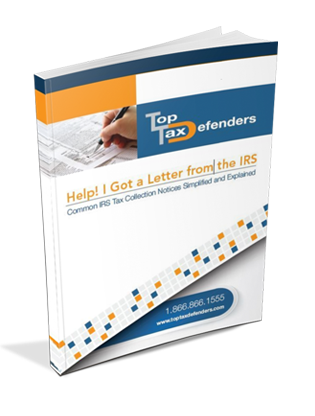Owe back taxes and think the IRS doesn't realize it? If you continue to ignore the problem, you will eventually end up with the IRS placing a Federal Tax Lien on your property, typically including your home.
>>Click Here For an Overview of the IRS Collections Process
Watch Top Tax Defenders Director of Operations Priya Mishra explain what the IRS can take if you fail to pay your taxes and how our team can help slow down the IRS Collections process.
What Is a Tax Lien?
A Federal Tax Lien means that the IRS has the right to seize your property if you fail to pay your back taxes. The lien protects the government’s interest in your property, including real estate, personal property, and financial assets. The IRS assesses your tax liability and sends a Notice and Demand for Payment with the amount you owe.
If you do not pay it, the IRS files a Notice of Federal Tax Lien to alert your other creditors that the federal government has a legal first claim to your property.
The Notice of Federal Tax Lien is also sent to local government authorities, such as the Secretary of State or County Recorder in the county where you live or own property. The lien does not specify which property it affects — it automatically applies to all real and personal property and future assets you may acquire during the lien's existence.
State taxing authorities can also place a lien, but you need to research your state laws to determine how it’s used and the procedures for dealing with it. Some municipalities sell tax liens to investors. The investors pay the tax bill in return for the right to collect the money and interest from property owners.
As home prices continue to rise, so do property taxes. If you have a mortgage bundled with an escrow account to pay property taxes, make sure your lender sends proof of payment annually. If you own the home outright, don’t forget to pay the property tax yourself. Be sure to respond to any correspondence from the taxing authorities or state revenue agency about delinquent property taxes (or any other state or local taxes).
>>Click Here For Answers to Your Questions About Tax Liens
Impact of a Tax Lien
Beyond the fact that the lien doesn’t let you sell your property, it has other effects on your life.
The IRS filing of the tax lien notice still tells creditors and lending institutions that the government has first dibs on your property.

A tax lien could make it challenging to get a loan or line of credit. Also, other entities like insurers and utilities might decide to adjust the rates they charge you. Tax liens aren't always removed automatically once you satisfy your tax debt. It can stay on your record for up to seven years unless you take steps to ensure removal.
Order credit reports from the three major credit agencies after the lien has been satisfied and follow up with the agency showing the lien. Use their procedure for disputing the report and requesting changes.
A tax lien attaches to all business property and all rights to business property. The lien even applies to your accounts receivable. If you file for bankruptcy, your tax debt, lien, and Notice of Federal Tax Lien may continue afterward. Bankruptcy doesn’t always get rid of it.
If you try to sell or refinance your home, the tax lien will surface during the title search. A lien can make it difficult to sell your home or receive a favorable interest rate for refinancing. Also, you will need to use any equity you have in your home to pay down your tax liability due to the lien.
If you do not address or resolve your tax debt issues, a tax lien may end in a tax levy.
>>Click Here to Learn How Tax Liens Affect Your Credit
How to Remove or Release a Tax Lien
The only sure way to get a tax lien released is by paying off your tax bill, including interest and penalties. It's the only way to ensure the IRS doesn't seize your property. Once the taxes are paid in full, the IRS has 30 days to release the lien.
If you can’t pay in full right away, notify the IRS and file an extension. You will have six months to get the money together. If you know that you cannot pay the debt in six months, you can negotiate a payment plan. The IRS offers installment plans and partial payment options for those who don’t have the entire amount ready to pay.
Remember that as long as you have an unpaid balance, it will accrue interest and penalties until wholly paid.
There are also other methods of releasing a lien.

Offer in Compromise
The Offer in Compromise program allows you to pay a portion of your tax bill, and the IRS calls it good. You must be up to date on all tax filings for all previous years and current on your tax filing and estimated tax payments for this year.
You cannot get an Offer in Compromise if you are in bankruptcy proceedings or under an audit. If you receive an Offer in Compromise, the IRS issues a lien release, not a lien withdrawal.
>>Click Here to Learn How to Make an Offer the IRS Will Accept
Appealing the Lien
You can appeal your federal tax lien.
One step you can take is to ask for a CAP hearing from the IRS Office of Appeals to have the levy or lien reviewed. You can request a due process hearing as soon as you receive a lien notice.
If you disagree with the decision of the IRS employee you consulted, you can ask for a conference with the employee's manager and ask the Office of Appeals to review the case.
You have a limited time to appeal, so you need to move quickly.
- If the lien is not already in effect, file the appeal by the deadline listed in the IRS lien notice.
- If the lien is already in effect, check the notice date. You have 30 days to appeal it, beginning five days after the lien was filed.
If your appeal request is denied, you can request a judicial review from the U.S. Tax Court. The petition must come within 30 days of the date the Appeals Office issues a determination letter.
If you miss the 30-day window for filing an appeal, you can file a request for an Equivalent Hearing using Form 12153. Still, it won't block a tax levy, suspend the 10-year statute of limitations, or allow you to go to court to appeal any decision by the IRS Office of Appeals.
An Equivalent Hearing must be requested within one year plus five business days after the Notice of Federal Tax Lien.
You can try appealing the lien using one of the following justifications:
- Your tax debt is already paid in full.
- The IRS filed the tax lien while you were in bankruptcy.
- The statute of limitations for the tax debt has expired - typically 10 years.
- The IRS did not give you a chance to dispute the lien.
- The IRS had no cause to file a lien, or the agency filed a lien due to a processing error with your tax form.
- You are eligible to participate in the Fresh Start Initiative or request Innocent Spouse Relief.
The IRS may be persuaded to release the tax lien if it would speed up collections or be in the best interest of both parties.
>>Click Here to Learn How to Appeal a Tax Lien
Subordination
Subordination doesn’t remove a lien. Instead, it allows other creditors in front of the IRS to receive payment. Subordination can make it easier to get a loan that you can use to pay your tax debt. Or a creditor may make the argument that satisfying the debt owed them should happen first — maybe the IRS agrees.
Determine your eligibility for subordination using Publication 794 Instructions on How to Apply for a Certificate of Subordination of a Federal Tax Lien. Most subordinations occur when the IRS places a lien against a property with a significant and clearly defined value, like a home or specific business.
The IRS may determine that it’s easier or quicker to collect from you once the creditor has sold the asset and agreed to a subordination.
>>Click Here to Learn How to Get a Certificate of Subordination
Withdrawal
A withdrawal removes the public Notice of Federal Tax Lien, assuring that the IRS is not competing with other creditors for your property. You are still responsible for the tax debt in full.
Use Form 12277 Application for the Withdrawal of File Form 668Y, Notice of Federal Tax Lien. The IRS issues Form 10916(c) as proof the tax issue was resolved.
The Fresh Start Initiative, beginning in 2011, offers two additional options.
- The IRS may allow withdrawal of the Notice of Federal Tax Lien after the lien is released. You must be in compliance with all individual, business, and informational returns.
- The IRS may allow withdrawal of the Notice of Federal Tax Lien if you converted or entered into a regular installment agreement to a Direct Debit installment agreement. You must be a qualifying taxpayer with individual or business income. The option also applies to out-of-business entities.
Withdrawal is only available if you owe $25,000 or less in taxes, interest, and penalties. If your balance is higher, you must pay it down to $25,000 to be allowed a withdrawal. Also, your Direct Debit installment agreement must pay your balance in full within 60 months or before the Collection Statute expires, whichever is earlier.
You must make three consecutive direct debit payments, fully comply with other filing and payment requirements, and cannot default on your current or previous Direct Debit installment agreements.
>>Click Here to Learn About Tax Lien Releases and Withdrawals
Discharge of Property
A discharge of property removes the lien from a specific property so you can sell it without problems. The expectation is that you use the proceeds to pay down your tax debt. Several Internal Revenue Codes determine your eligibility.
See Publication 783 Instructions on How to Apply for Certificate of Discharge from Federal Tax Lien.
>>Click Here to How to Get a Certificate of Discharge
Tax Lien vs. Tax Levy
A tax lien secures the government’s interest in your property for non-payment of tax debt.
A tax levy allows the government to seize the property to pay your tax debt.
If you don’t pay or make arrangements to settle your tax debt, the IRS can levy, seize, and sell any real or personal property you own or have an interest in. Levies include wage garnishments and bank freezes, as well as property seizures.
>>Click Here to Read About How a Tax Lien and a Tax Levy Differ
How to Avoid a Tax Lien in the Future
Avoiding a tax lien is simple — pay your taxes in full and on time.
If you cannot file or pay on time, do not ignore any letters or correspondence from the IRS. Always, always, always respond to these letters. Payment options are available to help you settle your tax debt over time.
>>Click Here to Read About How to Avoid Tax Liens
Hire Tax Professionals
If you have a Federal Tax Lien on your property, or are in danger of receiving one, you need the experienced professionals at Top Tax Defenders on your side. Top Tax Defenders takes fighting for our clients seriously, and offers a firm with experience:
>>Click Here to Read Real-Life Success Stories from Our Clients








